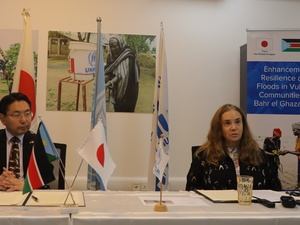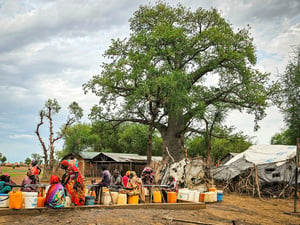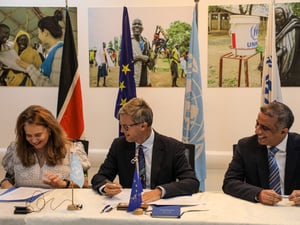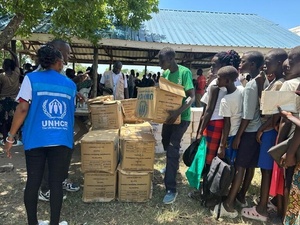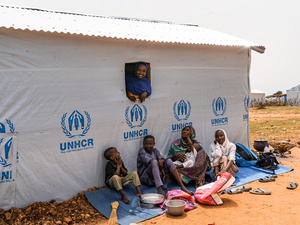Hundreds of refugees relocated to safety after deadly clashes in Ugandan refugee settlement
Hundreds of refugees relocated to safety after deadly clashes in Ugandan refugee settlement
UNHCR, the UN Refugee Agency, moved hundreds of refugees to safety between 16-17 July after deadly violence forced South Sudanese communities out of their homes in Uganda’s Palorinya settlement early this week.
According to reports, fighting between different South Sudanese tribes began on 13 July over the theft of crops in Dama village and rapidly escalated. Clashes between rival youth groups continued for several days, leaving three young South Sudanese dead – aged 16, 17 and 18.
Six people were injured during the clashes and rushed to Luru and Palorinya Health Centres for treatment. Three of them remain hospitalized, but they are in stable condition. The other three have been discharged. Over 280 shelters were set ablaze. Fearing retaliation, hundreds of families preemptively fled their homes and sought refuge at Luru, Itula and Orinya Primary Schools, Itula sub county headquarters and Morobi police station.
There have been no new clashes reported since Wednesday, but the situation remains tense. Law enforcement authorities are on the ground to monitor the situation. Thirty people have been arrested and are currently in custody at Obongi district police station as part of investigations.
UNHCR in coordination with the Office of the Prime Minister (OPM) and Obongi district authorities have been engaging refugee leaders and community structures to promote dialogue and peaceful coexistence.
“We are saddened by this tragic and senseless loss of life,” said Joel Boutroue, UNHCR Representative to Uganda. “UNHCR offers its deepest condolences to the families of the deceased.”
The Palorinya reception centre has been designated as temporary safe area. UNHCR and partners including African Initiatives for Relief and Development, Finn Church Aid, Lutheran World Federation, Medical Teams International and World Food Programme launched an emergency operation to provide assistance to 762 refugees displaced by inter-community violence. This includes 595 South Sudanese relocated last weekend by UNHCR from Luru Primary School, Itula sub county headquarters and Morobi police station, and 167 others who walked to the reception centre in the evening of 14 July. Nearly 80 per cent are children.
On arrival at the centre, refugees were provided with food, water and household items such as sleeping mats, blankets, mosquito nets, buckets, water cans and soap. Women and girls of reproductive age were supported with sanitary pads and underwear, while children received play materials.
The Ugandan police deployed additional personnel in Palorinya settlement to ensure the safety of the refugees sheltering at the reception centre and to prevent further violence. UNHCR helped the families of the deceased with burial arrangements and psychosocial counseling.
“We have witnessed a spike in community violence since the start of the COVID-19 crisis in Uganda,” said Boutroue. “The loss of livelihoods and increased idleness among refugee youth that followed the enforcement of lockdown measures have contributed to amplify inter-community tensions, deepening tribal cleavages that existed prior to the pandemic outbreak.”
Boutroue added that resources should be made available to enable humanitarian workers to meet the most basic needs of the refugees on one hand and invest in peacebuilding on the other.
Reconciliation efforts and community sensitization are underway at different levels to pave the way for the return of the displaced populations back into their communities.
“It is critical that the refugee representatives exercise strong leadership and act as ambassadors of peace and inter-community dialogue,” said Boutroue.
Uganda hosts over 1.4 million refugees, with South Sudanese nationals making up more than 65 per cent of the refugee population. The vast majority lives in settlements sprawling across Uganda, while six per cent have settled in Kampala.
For further information, please contact:
In Kampala, Duniya Aslam Khan, Communications Officer | [email protected] | +256 772701101




